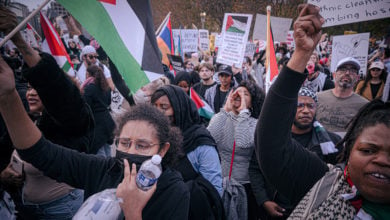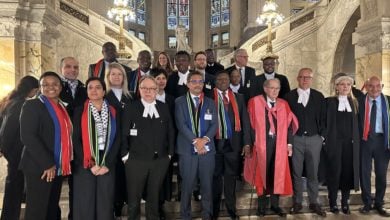A general strike for Dec. 4 was called for by opponents of President Mohamed Morsi who object to a hurriedly drafted constitution and decrees issued by Morsi expanding his powers. Major newspapers announced plans to suspend publication and privately owned TV stations went dark
In response to this call, tens of thousands rallied and gathered at the presidential palace in opposition to Morsi’s latest moves. Protesters chanted: “Morsi sold the revolution” and “Down! Down with Morsi.” The police fired tear gas and warning shots as protesters approached the presidential palace and broke through a police checkpoint.
On Dec. 5, heavy fighting took place between supporters and opponents of Morsi near the presidential palace, leaving at least six people dead and hundreds injured. Morsi had fled the palace the previous day in response to a massive demonstration.
Morsi had issued an executive decree on Nov. 22, which announced his edicts over any court along with a constitutional declaration that came immediately after he helped broker a ceasefire between Gaza’s Hamas and Israel.
The timing of Morsi’s declaration was not accidental. It came just one day after he played a key role, working closely with U.S. Secretary of State Hillary Clinton, in brokering the Gaza ceasefire on terms which did not include ending the blockade of Gaza. Washington’s gratitude was reflected in its very muted response to Morsi’s seizure of dictatorial powers.
On Nov. 30, tens of thousands of Egyptians rallied in Egypt’s Tahrir Square as well as in other major cities after the Muslim Brotherhood-dominated constituent assembly approved the controversial constitution.
Egyptians took to the streets in opposition to the constitution falling short over issues such as women’s rights, religious freedoms, and freedom of the press. The opposition forces accused Morsi “of establishing a new autocracy in Egypt.” Morsi justified his decree as a necessary step to eliminate all forms of corruption and the remaining elements of the old regime.
The draft constitution was approved by the constituent assembly in a public and televised meeting. The voting session took 16 hours to approve each of 234 individual articles. The newly-drafted constitution is highly controversial for many Egyptians who fought against the Mubarak dictatorship.
For example, Article Two states: “Islam is the religion of the state and Arabic its official language. Principles of Islamic Sharia are the principal source of legislation.” The wording of the article has created a lot of debate within the secular and Christian circles given the presence of an Islamist-dominated assembly.
Article 48 states: “Freedom of the press, printing, publishing, and other media is guaranteed. … Control over what is published by the media is prohibited, but there may be an exception in times of war or national mobilization.” The term “national mobilization” has legal implications regarding the establishment of emergency laws, which were used under former presidents Sadat and Mubarak.
Women are only referred in Article 10, which calls for “reconciliation between the duties of a woman toward her family and her work.” Hence, the anti-Morsi demonstrators are demanding equal representation for all Egyptians in the new constitution.
On Dec. 3 the Supreme Judicial Council agreed to oversee the referendum to be held on the draft of the new constitution. This comes despite an announcement by Chancellor Ahmed el-Zind, president of Egypt’s Judges Club, that the club refuses to supervise the constitutional referendum, scheduled for Dec. 15, until Morsi’s constitutional declaration is canceled and all of its implications have been clarified.
Opponents of the constitutional declaration and the new constitution are continuing their sit-in in Tahrir Square, while supporters of President Morsi are continuing their sit-in in front of the Supreme Constitutional Court to protest an expected verdict which would dissolve the Shura Council and declare illegal the committee that supervised the drafting of the constitution.
On Dec. 2, the court suspended its work when hundreds gathered in front of its headquarters in Cairo, preventing the judges from attending a session that was supposed to look into the constitutionality of the law to elect the Shura Council and composition of the constituent assembly that finished drafting the new constitution on Nov. 30. A number of questions are being raised around the validity of the voting process if the judiciary does not supervise the referendum, especially if the vote is in favor of the constitution. Parliamentary elections are scheduled to take place two months after the referendum, and the judges may boycott supervising it as well.
The judges have insisted on suspending their work until the president cancels his recent decisions, which they described as a major interference in the works of the judicial authority and violation of the independence of the judiciary. Ahmed Abu Baraka, one of the leaders of the Freedom and Justice Party, the political arm of the Muslim Brotherhood, said that the president may issue a new constitutional declaration that would allow lawyers, university professors or other social groups to supervise the referendum, which would further complicate things.
President Morsi is a member of the Muslim Brotherhood, which was once banned under Mubarak’s regime. He won the election by a small margin against former Prime Minister Ahmed Shafiq.
President Morsi first consolidated his power with the removal of Field Marshall Tantawi, Mubarak’s defense minister, and the army chief of staff, Sami Anan. The justification for their removal was the attacks in Sinai that left 16 Egyptians dead; Lieutenant General Abdel Fattah al-Sisi was named as defense minister. Both Tantawi and Anan were awarded honorary badges.
The removal also came with immunity for Tantawi and Anan for all their crimes committed in the so-called “transitional period” after Mubarak’s departure. Hence, the military was in a sense neutralized and a strong alliance between the army heads and Brotherhood was formed. The military has a strong incentive to get immunities in the constitution and within their institutions for its previous role under Mubarak.
The military also reserves the right to control its own budget and foreign policy, which includes maintaining the Camp David accords with Israel and receiving millions of dollars of military aid from the United States. The Brotherhood was the first political force to sit with the military council after Mubarak’s ouster and continues to cut deals with the military.
The United States’ position is unchanged in regards to Egypt, as hundreds of millions of dollars have poured in to the Egyptian military throughout the year-and-a-half transitional period. The United States views Egypt as an important strategic ally in the region to secure Israel’s security and that of the monarchy-ruled, oil-producing countries such as Saudi Arabia. The American ambassador in Egypt and Hillary Clinton have repeatedly met to discuss the aid packages and the transitional phase for Egypt.
Morsi’s latest action responded to a few of the demands of the revolution, which included impeaching Mubarak’s prosecutor general, Abdel-Megeid Mahmoud, a notorious figure of that regime’s corruption. Mahmoud’s removal was a response to the sham trial of Mubarak, his deputies and his corrupt tycoons. At the same time, Morsi gave himself unchecked powers.
The protests continue against Morsi not only because of the constitution and his sweeping powers, but because a lot of Mubarak’s policies have not changed. Morsi has not cleansed the interior ministry nor held any other notorious figures of the regime accountable for political and economic crimes. Moreover, Morsi’s government has not relieved the economic misery of the masses or reduced inflation.
The previous regime’s neoliberal policies have not changed either. The Brotherhood welcomed the IMF and the World Bank’s loans of $4.8 billion. One of the reasons why the revolution erupted was because of the soaring prices of food and necessities, partly stemming from Mubarak’s privatization policies of agricultural lands and government-owned industries.
The violence, protests and massive demonstrations in Egypt are clear signs that the revolution is unfinished and still alive. The opposition to the Morsi government is made up of diverse, multi-class forces ranging including labor activists, students, secular nationalists, women’s groups, bourgeois elements, Coptic Christians and socialists.
The revolutionary forces have continuously been on the streets leading grassroots campaigns against first Mubarak, then the ruling generals, and now the Muslim Brotherhood. The uprising which began Jan. 25, 2011, showed the world the power of mobilization.
Long live the Egyptian revolution!






